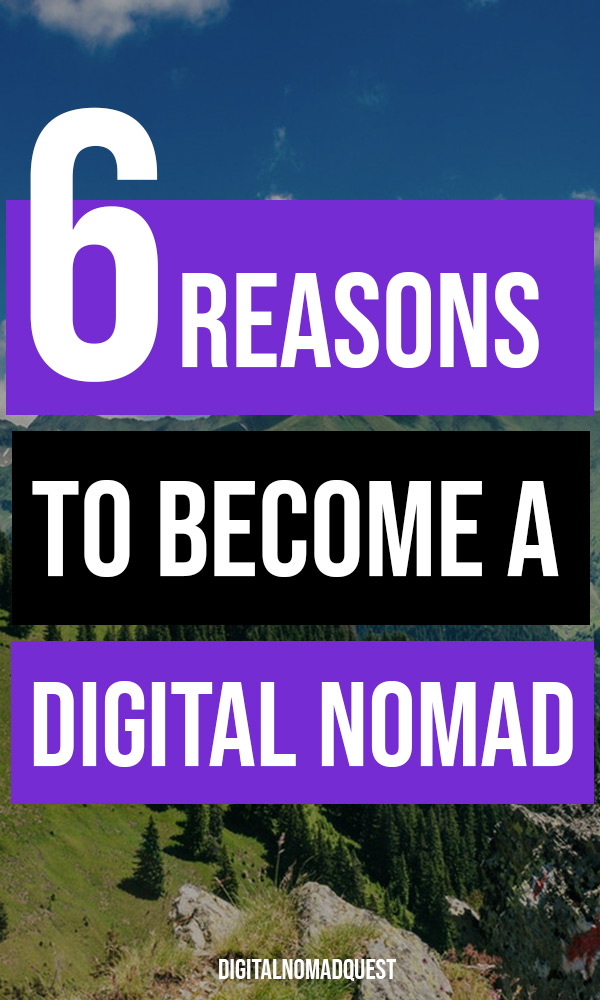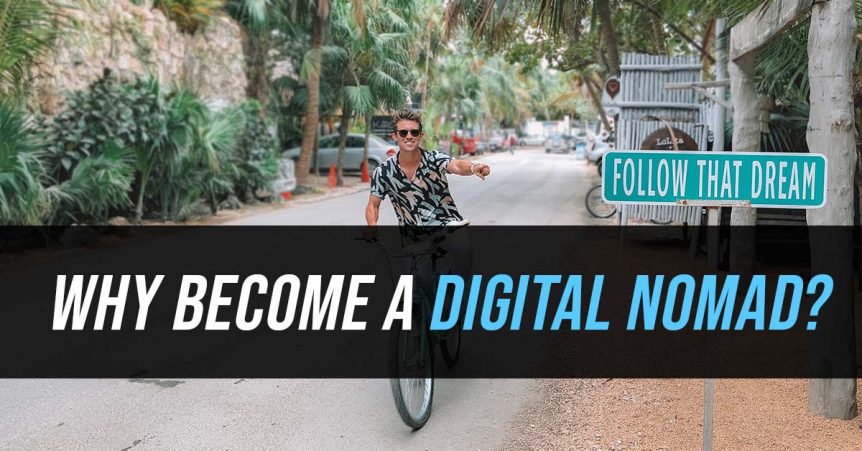Why become a digital nomad? Here are the top reasons for becoming a digital nomad. The important thing to keep in mind is that being a digital nomad looks different for everyone. Some people stick to just a few locations per year. There is an entire subculture of people with amazing renovated camper vans who travel domestically as they work remotely. Some people may juggle multiple freelance jobs, which can include a mix of location-dependent and location-independent jobs. The key to being a digital nomad is flexibility and freedom.
How do I start?
Just as everyone’s digital nomad experience will be different, the path to getting there looks different for everyone as well. My first job out of graduate school was fully remote, even though I lived an otherwise normal life bound to the same city. I learned how to work remotely and still interact professionally with clients. I learned what worked for me and what didn’t. This was several years ago when technology solutions for working remotely were limited. I am so grateful now for the current technology that supports working remotely!
A few years ago I quit my job to travel for a year. I got rid of my apartment, sold most of my stuff, and cancelled most of my recurring bills except for the basics, like my cell phone plan and travel insurance. This experience built the foundation for my digital nomad lifestyle now, because I found that traveling is cheap when I’m not paying for an apartment and related expenses at home at the same time. I also got accustomed to living with less stuff.
I’m going to start with the more practical reasons to be location-independent. At this point you might only be thinking about the travel, but there are many more!
Why Become a Digital Nomad? Here are 6 Reasons
1. Spend Less Money on Living Expenses
Many of my friends left the San Francisco Bay Area because they couldn’t afford it anymore. The few who stayed were able to because of rent control, several roommates, help from parents, or getting lucky with a high-tech start up. Although many of my friends decided to move to less expensive cities, some of us just decided to go nomad!

Of course, the first thing to consider is how to keep your income high while decreasing your living expenses. For some folks, it does make sense to spend a few years establishing a career and learning their chosen industry. There are benefits to working at a brick & mortar job, like access to mentoring. You may also need to think about student loans. Just because you have current obligations doesn’t mean that you can’t start thinking about your digital nomad strategy now!
Becoming a digital nomad requires planning. I personally spent a year planning my life before taking that first year to travel. I started keeping an extremely detailed budget in order to track where I was spending money, what I should cut out. This is something that you should do anyway, even if you aren’t going nomad! This helped me estimate my future costs living abroad. I checked the prices of several AirBnBs and hostels in each place that I considered visiting. Research is a key component of a successful digital nomad lifestyle.
At this point I’d already had enough career experience that I knew I could always come back and get a job in my industry if I failed. I’d also had the opportunity to save up all the money I needed, since I wasn’t planning to work on my first long-term trip. I opened a credit card that earned frequent flier miles, and put everything on that card for the next year. Minimizing my risk definitely helped me take the plunge with traveling long term, even without having an income. Now I travel with income from a few freelance jobs.
What Did I Spend on My First Trip?
My first trip ended up lasting for nine months total, since I decided to come back early for a school program. I spent roughly one month each in Peru, Ecuador, Colombia, Brazil, Argentina, Chile, New Zealand, Vietnam, and Indonesia. I had some short stops in Singapore and Uruguay. I used frequent flier miles strategically to move from South America to New Zealand in a way that allowed me to stop at home for Christmas. (Remember planning!)
I spent around $3000 in upfront costs for things like passport renewal, vaccinations, travel insurance, gear, and my major international flight to get started. After that I spent about $18,000 for nine months on the road for everything: lodging, food, short flights, buses, and one splurge a month, like scuba diving. $21,000 for nine months of fun. I could barely survive on four times that amount in San Francisco. Since I had eliminated most of my living expenses back home, this number was nearly all of what I spent during that time, period. Now I travel more sustainably, with an income.
2. Stop Being Tied to Stuff
I sold most of my stuff, which gave me a few thousand dollars for traveling. I spent a solid two months using Craigslist and apps like OfferUp, which is a job in itself. I still kept the most important things like my car just in case, but as of now I only have a few things in storage at my parents’ house. I don’t own a car anymore, which means I don’t pay for insurance or gas. I don’t pay for all sorts of services or buy a bunch of cute stuff every time I see it. Simply having a lot of stuff costs money!
This concept of not being tied to stuff has come up a lot lately, and not just for travelers. The popularity of Marie Kondo’s books is proof that many people feel overwhelmed by too much stuff. Does all your stuff truly bring you joy? Mine did not. When I was on the road I found that I missed my clothes and shoes, some of my electronics, and not much else. I missed friends and family, and certain conveniences. I forgot I even owned half the stuff that I kept in storage. I felt much happier spending my time and money on experiences.
3. Find Your Work-Life Balance
Workaholic culture is a real thing in the United States. In many cases it has become a necessity due to increasing rent prices, student loans, and health care costs. If you really think about it, you may realize that a large part of your identity is tied to your career. That isn’t necessarily a bad thing- I’ve always been very career focused. However, I often found myself having negative thoughts about my own self-worth just because I didn’t want to be a slave to my job or work ten hours a day.

I’ve never been able to sit at a desk for eight hours, so I’ve always found ways around it. In the past this included freelance contracts and working remotely in the same city. I’ve also worked in laboratories and classrooms, which gave me a lot of variety throughout the day. Even still, I didn’t like having to answer to a boss about my time and actions every day. I did not like feeling defensive simply for wanting to go home after eight hours of work.
What I’ve found while traveling is that many other cultures don’t expect that kind of workaholic lifestyle. In many parts of the world, a better work-life balance is normal, because health care, education, and rent are more affordable. This is especially true if you have a decent income from working online. I find that I now have less stress, and more energy to pursue hobbies and side projects that can earn money.
4. Travel Better
Travel is often the primary reason why people want to become a digital nomad. It was for me! At 45 countries, I still have so much more to see. Traveling as a digital nomad allows you to not just travel more, but travel better.
Travel at a Slower Pace – If you only get two weeks off from work, chances are you have to pack as much activity into those two weeks as possible! Odds are you’ve come back from many trips exhausted, needing a second vacation. Long-term travel requires a different approach. Sometimes you want to climb a mountain or do a walking tour, sometimes you want to lay in a park and people-watch, and sometimes you just want to stay inside and watch Netflix or read. As a nomad, you have that freedom to go at a more relaxed pace. In fact, going slower is a necessity for avoiding burnout.

Travel Cheaper – Having a flexible schedule means that you can take the cheapest flight on a Wednesday afternoon instead of Sunday, when everyone else is trying to make it back to work. You can also take longer, cheaper bus rides, which can be a great way to see a new country. When you aren’t tied to peak season prices, you have more options. AirBnBs also offer discounts for booking full weeks or full months.
Experience Things as a Local – The more time you can spend in a location, the more you’ll find out about local-only events and experiences. Find that random little restaurant or bar in a neighborhood that isn’t right next to the hotel district. Take public transportation. Get to know local people and cultures rather than buying a tourist package.
5. Find Your Community
There are more people living as digital nomads than you realize! Leaving a close group of friends or family might seem scary, but you will soon find a community of like-minded people. Social media can be a great tool for finding those communities, or you can meet people in hostels and co-working spaces. Co-working spaces aren’t just for social interaction! Use them as a place to network with other nomads and exchange ideas to develop your business.

Learning the local language will also help tremendously if you plan on staying in a region for a while. I would have had a very different experience in Latin America if I hadn’t learned some Spanish first. People are generally eager to practice English too. Language exchanges are great opportunities to meet people who want to practice English while you get the chance to practice another language in return.
6. Because the Digital Nomad Lifestyle Can Be Whatever You Want!
There are so many ways to do this, based on your needs and interest. Maybe you only have a few years to work as a nomad before going to graduate school or starting a family. You can spend half the year as a nomad, half the year in a single location. You can travel around your own country experiencing a new city every few months. Being a nomad doesn’t necessarily mean that you have to go abroad. You might find your dream location abroad and set down roots while continuing to work online.
Conclusion
There are so many great reasons to give the digital nomad lifestyle a shot! Save money, travel, go on amazing adventures, and develop professionally at the same time. You can always start with baby steps over the course of a few months, and see how you do before going all in. If you have other great reasons why you became a nomad, let us know in the comments!


